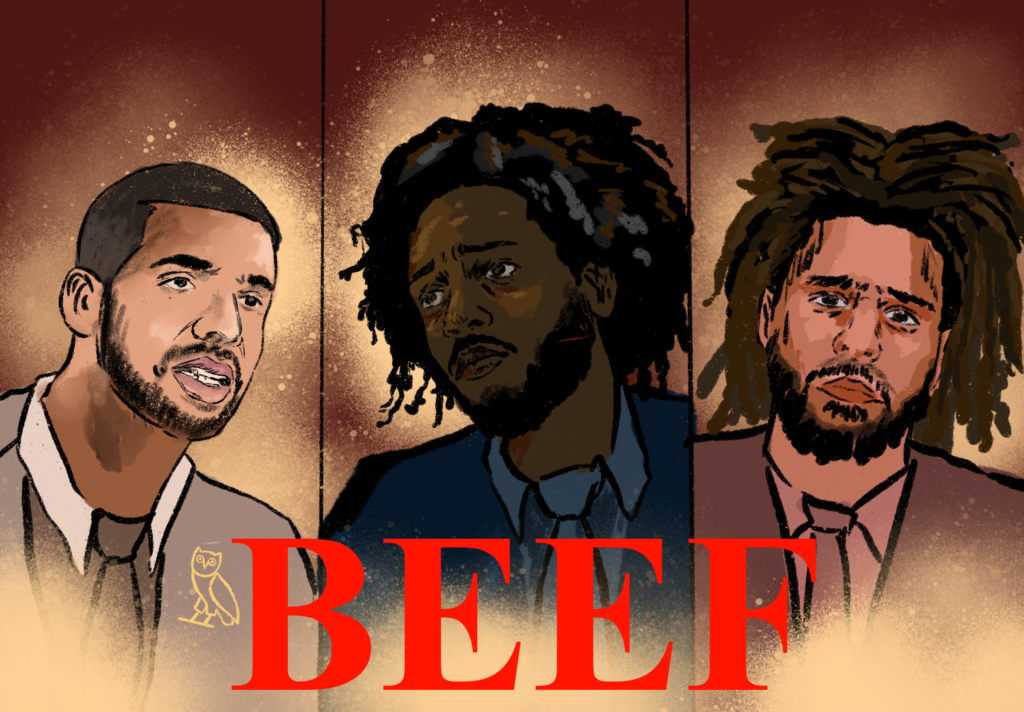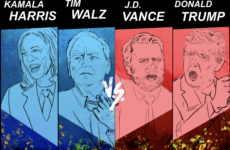
Graphic by Evelyn Kim ’25/The Choate News
By Stan Cho ’25, Opinions (Nation/World) Editor
The three most threatening and anticipated words in the music industry this past summer were “Kendrick dropped again.” In the aftermath of a feud in which rapper Kendrick Lamar claimed himself a cultural visionary and rapper Drake boasted about his record-breaking career, rapper J. Cole released a new single “Port Antonio.” J. Cole’s humble clarification for why he avoided involving himself in the conflict parallels my confusion about a hip-hop feud seemingly built on exaggerated insults instead of artistic authenticity.
These feuds, known as “beefs,” are commonplace in the hip-hop genre. Notable feuds in the past include street-cred brawls between 2Pac and The Notorious B.I.G. or personal disagreements between Jay-Z and Nas. Yet the single factor consistent throughout all rap beefs (as well as the most important variable in determining who “wins” a beef) is to figure out who the better rapper is. And that very same factor was found in the Kendrick-Drake feud.
This beef started with Drake’s “First Person Shooter,” in which featured artist J. Cole asserts that the rap industry is helmed by Kendrick (who previously performed under the pseudonym K-Dot), Drake (whose legal first name is Aubrey), and himself — a supposed “big three.”
Kendrick’s response shocked the rap community, as he positioned himself as the sole figurehead of the genre and viciously tore down Drake and J. Cole. Kendrick’s response was a direct challenge to Drake and J. Cole’s artistic integrity, critical reception, and influential reputation. In an industry shaped by clicks and streams, Drake and J. Cole were forced to rebut. Drake took an offensive stance, responding not only to Kendrick but to any other artist he deemed necessary, including A$AP Rocky and The Weeknd. But public perception shifted against Drake after Kendrick’s back-to-back releases — “Euphoria,” “Meet the Grahams,” and “Not Like Us” — dealt a devastating blow by questioning Drake’s capability to be a father, labeling Drake as a pedophile, and criticizing Drake’s commitment to Black people. These insults positioned Drake as the “loser” of the feud.
J. Cole initially defended himself with “7 Minute Drill” on his album Might Delete Later, where he claims that Kendrick’s discography is overpraised. But just after two days, on April 7, J. Cole took the song off of streaming services and publicly apologized for involving himself in the feud, explaining that his diss track misaligned with his authentic respect for Kendrick and Drake.
Many have criticized J. Cole for his decision to back out of the feud. They claim that J. Cole could have been a substantial competitor in the feud, but his cowardice prevented him from releasing highly anticipated music in response to the feud.
But when you take away the Metro Boomin-produced beats and the anticipation for each artist’s response, these diss tracks come off as churlish to me. In the chase to win the competition, both Drake and Kendrick have not only neglected the beauty of collaboration but also the need for authenticity. Kendrick’s disdain towards Drake’s parents was met with cut-throat disses questioning Kendrick’s adultery and refusal to marry his fiancée. In favor of a memorable track or two, we fail to address the implications of exaggerated defamation to both the integrity of the genre and the safety of these artists (take 2Pac and The Notorious B.I.G., who were both murdered during their feud).
In “Port Antonio,” J. Cole reaffirmed the impressive legacies left by these two artists, expressing his gratitude for their personal involvement in his career and his pride in collaborating with such figures. Drake is the highest-certified digital singles artist in the United States and holds multiple records on the Billboard Hot 100, including being tied with Michael Jackson for most number-one singles by a male solo artist. Kendrick has won 17 Grammy Awards (the third most for any rapper), has received the Pulitzer Prize for music in his album DAMN (becoming the first person to win the award for music that isn’t classical or jazz), and is helmed by the entire West Coast scene as a spiritual successor to the revolutionary rapper 2Pac.
Given these impressive resumes, J. Cole criticized the feud. “I understand the thirst of being first that made them both swing. Protecting legacies, so lines got crossed, perhaps regrettably,” he said. And J. Cole’s right. While it’s important for these artists to be aware of their impact to fuel ambitious projects and impressive performances that add to their repertoire, this entire feud started with fragile pride and ended in ad hominem attacks.
In his new single, J. Cole went on to explain that his involvement in the feud would have resulted in more than just public humiliation: “I wouldn’t have lost a battle, dawg, I woulda lost a bro. I woulda gained a foe, and all for what? Just to attain some more props from strangers that don’t got a clue what I been aiming for?”
The key word here is “exaggerated.” It’s difficult for me to resonate with the hatred spewed between Kendrick and Drake, as I’m not fully convinced that these artists care much for the feud beyond preserving their reputations — Kendrick as some messianic lyricist and Drake as a global hitmaker. This genre shines most brightly when the songs truly reflect the artist’s authenticity. Some part of me is disappointed that Kendrick and Drake have seemingly forgone this authenticity and clarity in favor of destructive intent. J. Cole might not have “won” this feud, but at no point does he allow himself to fall into a malicious chain of lies and deceit. By acting in accordance with authenticity and maturity, J. Cole remains the sole bona-fide survivor of this feud.




